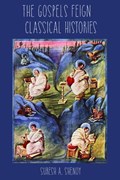Have you read a history that is a non-history and a non-history that is history? At first glance, the question is a riddle wrapped in a contradiction. By customary norms of literature, it is mysterious if not nonsensical. That is, until one has read Jorge Luis Borges and Garcia Marquez, the masters of Magic Realism.
Writings in the mode of Magic Realism have the quality of magic. As by a sleight of hand, what is real looks like fantasy and what is fantasy from another angle looks like real. The constant demand on the reader to adjust perspectives is part of the textual presentation in this mode. That is the charm of Magic Realism.
Christians had contact with something more advanced than Magic Realism for close to two millennia in the Gospels. They read them and meditated upon them. In all that time, while aware of the mysterious quality of the Gospels, they could not explain what gave these books the rare quality.
The Greco-Roman Church explained away the all too apparent mystery of the Gospels. The official Church, insisting that it was serious, spread the story that the Gospels were of a unique genre of 'Sacred Scripture'. The uniqueness was a gift from God, it told the believers. God through His personal intervention inspired the Evangelists to tell their stories as they did with warts and all. Thus divinely planned and humanly executed, the Gospels were free of error and sure guides to our eternal salvation. They were the written 'Word of God'.
The Church did not tell their followers that their explanation about the 'Sacred Scripture' was indeed reflecting the quality of Magic Realism itself. That is to say, they were not explanations at all but only seemed like explanations. They were poorly thought out excuses.
Whereas Borges and Marquez confined Magic Realism to the presentation of their texts, the four Gospels went beyond. They imaginatively created the contents of their texts and the manner in which they structured them in genre behind genre. It was in 'genres disjunction'.
Mark added ironic subtext to the foreground text of the Gospel and added Classical History genre in the background and the genre of monomyths further in the background. Matthew did the same with more details. John had the Gospel in the foreground while Classical History in the background. Luke brilliantly outdid them all. He had a parody of the Gospel in the foreground, with Classical History, and three monomyths with a five-Act tragedy, one behind the other in the background.
This study, The Gospels feign Classical Histories discusses the first background texts. It shows that what seem like the Gospels are not Gospels but classical histories. Further studies will show that as the readers' perspectives change the Gospels will appear like something else.

